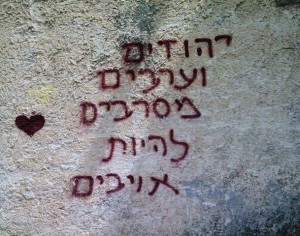In the wake of the Lebanon War (which started 31 years ago this week) there was a tectonic shift in the political discourse in Israel. One of the aftershocks of this movement of the political plates created a fissure in the Religious Zionist community which opened a space for a religio-political discourse that privileged people over land, and opened the possibility of a territorial compromise for peace between Israel and Palestine. Ultimately, though the community of left of center religious zionists who privilege peace over territory survives, they won a few battles but are losing the war.
Two months before the start of the June 1982 Lebanon War, the Israeli army completed its withdrawal from Sinai. This withdrawal was accompanied by a paroxysm of religious and political activism, gnashing of teeth, tearing of clothes, mourning and wearing of sackcloth and ashes (sometimes literally). Under the banner of “There will be no retreat,” the messianic Zionists of Gush Emunim tied their political triumph to a path to salvation which they and their spiritual leaders saw as dependent on expanding the territory of the Kingdom of Israel. In the wake of the withdrawal from Sinai, while most of Israel celebrated a new era of peace with Egypt, this community was in a state of shock and disbelief, not comprehending how the actual course of history had impacted their vision of that course.
It was with this baggage that religious Zionists went to war in Lebanon.
Ten percent of the casualties in the first week of fighting were soldiers who were in units of the Hesder—the “arrangement” in which boys studied Torah in a Yeshivah interspersed with army service. (The bulk of the Yeshivah students served in tank units which were hard hit in the first days of the conflict.) The Hesder yeshivot were the crème de la crème of the Religious Zionist movement. These were the students who had been schooled from birth, more or less, on the ideals of the Torah of Israel, the Land of Israel, and the people Israel. The three were inseparable. They were adherents of the philosophy of Rabbi Abraham Isaac Kook, the first Ashkenazi Chief Rabbi of Palestine and a mystic Zionist, who had taught that the land of Israel was an essential part of the people of Israel. They imbibed the philosophy of Kook’s son Zvi Yehudah who taught that as the land of Israel grew so too did the presence of God.
These students were the shock troops who answered the call to build settlements in Sebastiya, and reclaim the Muslim Quarter of the Old City of Jerusalem, and rebuild Jewish Hebron.
The war did not go as planned. The war was considered an elective war by many, if not most Israelis, and there were intelligence screw-ups, and “friendly-fire” incidents. Finally there was the massacre of Palestinian civilians in the Sabra and Shatilla refugee camps (for which the IDF and Ariel Sharon in particular were held to have indirect responsibility).
With this as the background, you may start to understand the enormity of the shift when at the founding assembly of a new organization called Netivot Shalom (“ways of peace”), the organizers and all the speakers were graduates of the religious Zionist youth movement, or the Hesder Yeshivas—or the leaders of those Yeshivas. The room was packed with the very people whom one would assume would have been demonstrating support for the war and more settlements. Here were heads of yeshiva who were calling for reflection, and a change of course. Rabbi Amital, who himself was one of the founders of Gush Emunim (the “bloc of the faithful”) which was the avant garde of the settlement movement, declared that the avant garde had moved so far ahead that they could no longer see the people or vice versa and it was time to rethink.
A new conceptual vocabulary rose, drawn from the same textual tradition, but this time privileging the texts which lauded the greatness of peace over land. Study groups formed which analysed classical texts dealing with peace and compromise. Rabbis and academics and prominent members of the religious community openly argued for territorial compromise as a religious imperative. A new religious political party was formed whose platform challenged the hegemony of the settler movement over the National Religious Party (NRP). The party, Meimad, failed massively in its electoral bid—not winning even one seat in the Knesset.
Although the victories were never complete, perhaps not even really victories, from that time there has been a persistent voice for peace and territorial compromise and human rights (in various shades) coming from the religious camp. The tragedy is that thirty one years later (after one assasination, two intifadas, a unilateral withdrawal, a major expansion of settlement activity, a couple of wars and incursions, massive numbers of casualites) we are at the same place in the conversation. Is it true that “Great is Peace” or more true that “The Land of Israel is an integral part of the people of Israel? Will we see more books arguing that non-Jews in Israel are not equal to Jews (as the IDF Rabbinate recently did) or more voices arguing for human rights and the necessity of a Palestinian State side by side with the State of Israel? The debate is, of course, about the future of the State of Israel and justice for the Palestinians. But the debate is also about the soul of Judaism.

“… from that time there has been a persistent voice for peace and territorial compromise and human rights (in various shades) coming from the religious camp” Is there some place one can find that voice in (or translated into) English?